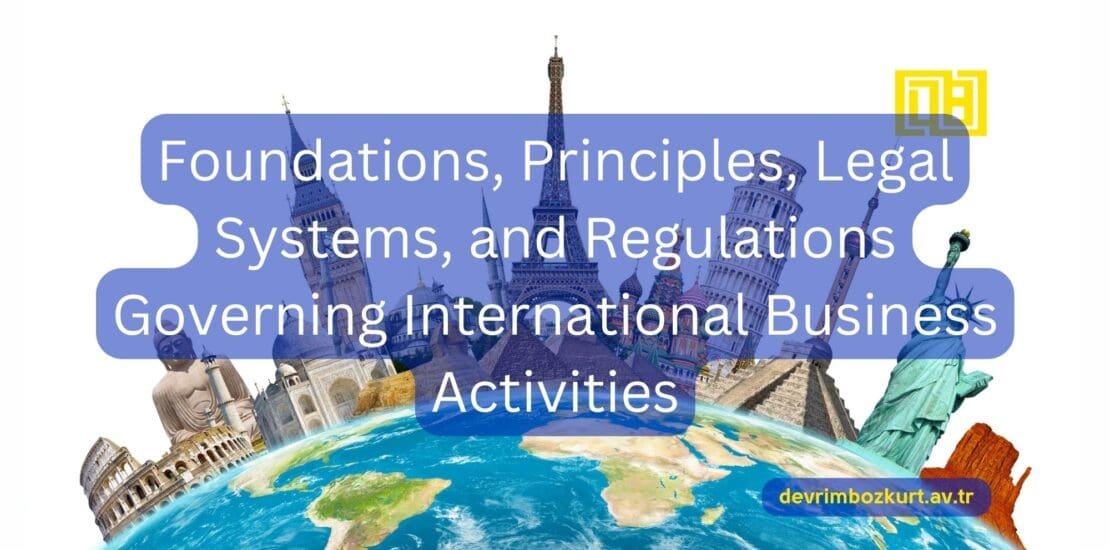Foundations, Principles, Legal Systems, and Regulations Governing International Business Activities
- 22 Şubat 2025
- Yayınlayan: Avukat Devrim Bozkurt
- Kategoriler: Business Law, English, International Law, News & Articles

An Overview of the Global Business Framework
Foundations of International Business
International business encompasses all commercial transactions that take place between two or more regions, countries, or nations beyond their political boundaries. The foundations of international business are rooted in the principles of trade, investment, and economic interdependence. These activities are driven by the desire for profit, market expansion, and the acquisition of resources.
Economic Theories
Several economic theories underpin international business activities:
- Comparative Advantage: This theory, proposed by David Ricardo, states that countries should specialize in producing goods for which they have a lower opportunity cost, thereby benefiting from trade by specializing and exchanging those goods.
- Absolute Advantage: Introduced by Adam Smith, this theory suggests that if a country can produce a good more efficiently than another, it should produce and export that good.
- Heckscher-Ohlin Theory: This theory posits that countries will export products that utilize their abundant and cheap factors of production and import products that require factors in short supply.
Globalization
Globalization has facilitated international business by breaking down barriers to trade and investment. It involves the integration of national economies through trade, investment, capital flow, labor migration, and technology.
Basic Principles of International Business
The principles that guide international business include:
- Commitment to Free Trade: Promoting the free flow of goods, services, and capital across borders.
- Respect for Local Cultures: Understanding and respecting the cultural differences and practices in different countries.
- Adherence to Ethical Standards: Maintaining ethical standards, such as fair labor practices, environmental sustainability, and corporate social responsibility.
- Transparency: Ensuring transparent business practices and disclosing relevant information to stakeholders.
- Compliance with Laws: Abiding by the legal regulations of the host countries.
Legal Systems Governing International Business
International business operates within a complex legal framework that includes various legal systems and jurisdictions:
- Common Law: Based on precedents and judicial decisions, common law is practiced in countries like the United States, the United Kingdom, and Canada.
- Civil Law: Civil law systems, found in countries like France, Germany, and Japan, are based on codified statutes and laws.
- Religious Law: Some countries follow religious laws, such as Islamic law (Sharia), which governs business activities in countries like Saudi Arabia and Iran.
- Customary Law: Customary law is based on traditions and customs and is practiced in some African and indigenous communities.
International Legal Instruments
Several international legal instruments regulate business activities across borders:
- United Nations Convention on Contracts for the International Sale of Goods (CISG): This treaty provides a uniform framework for international sales contracts.
- International Chamber of Commerce (ICC): The ICC issues guidelines and rules, such as Incoterms, for international trade.
- World Trade Organization (WTO): The WTO sets the global rules of trade between nations and resolves trade disputes through its dispute resolution mechanism.
- Bilateral and Multilateral Treaties: These treaties, such as free trade agreements (FTAs) and investment treaties, facilitate trade and investment between countries.
Regulations Governing International Business
Various regulations ensure fair and orderly conduct of international business:
- Trade Regulations: Countries impose tariffs, quotas, and trade barriers to protect domestic industries and regulate imports and exports.
- Intellectual Property Rights (IPR): International agreements, such as the Agreement on Trade-Related Aspects of Intellectual Property Rights (TRIPS), protect patents, trademarks, and copyrights across borders.
- Anti-Corruption Laws: The Foreign Corrupt Practices Act (FCPA) in the United States and the UK Bribery Act regulate and penalize corrupt practices by businesses operating internationally.
- Environmental Regulations: International agreements, such as the Paris Agreement, set standards for environmental protection and sustainability.
- Labor Laws: International Labor Organization (ILO) conventions establish labor standards, including minimum wage, working conditions, and rights to unionize.
- Financial Regulations: Regulations such as Basel III set standards for international banking and finance to ensure stability and reduce systemic risk.
Dispute Resolution Mechanisms
Disputes in international business can be resolved through various mechanisms:
- Arbitration: International arbitration, often facilitated by organizations like the International Centre for Settlement of Investment Disputes (ICSID) or the ICC, provides a binding resolution to disputes.
- Mediation: Mediation offers a non-binding, amicable resolution process where a mediator facilitates negotiations between the parties.
- Litigation: Cross-border litigation involves court proceedings in the relevant jurisdictions but can be complex due to differing legal systems and enforcement of judgments.
Conclusion
Navigating the landscape of international business requires a thorough understanding of its foundations, principles, legal systems, and regulations. By adhering to these frameworks, businesses can operate effectively and ethically on a global scale, fostering economic growth and international cooperation.







